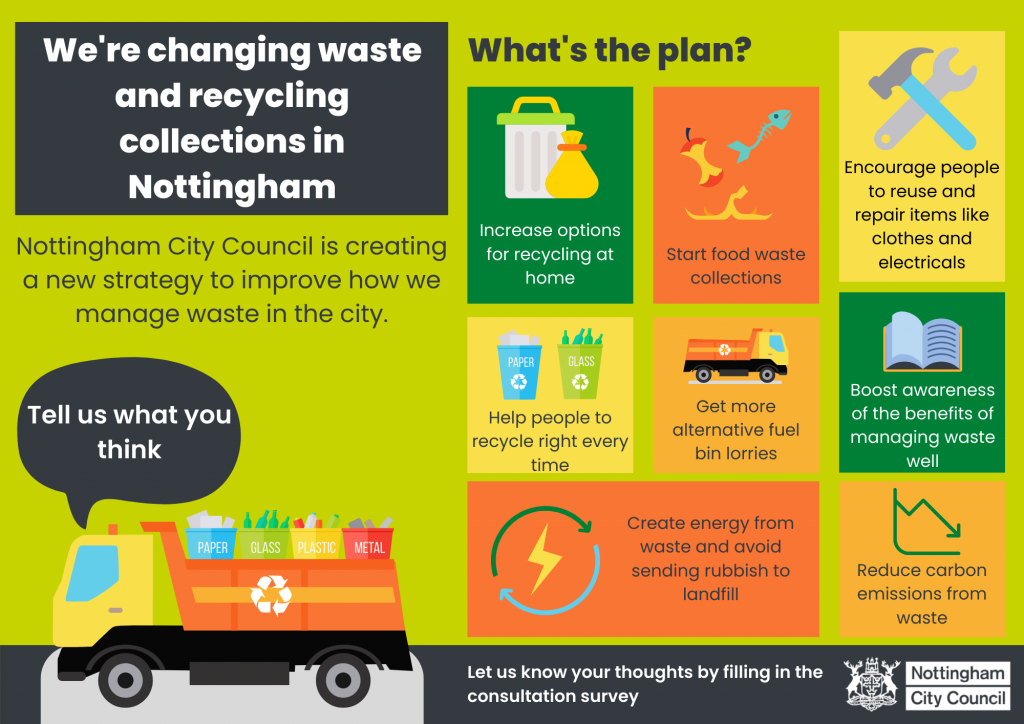An eight-week consultation to collect views on proposed changes to waste services in Nottingham opened today.
Developed alongside specialist partners, Frith Resource Management, Nottingham City Council has created a draft Municipal Resources and Waste Strategy 2023-2050. The strategy outlines how waste and recycling could be collected differently from homes and organisations in the city to improve recycling rates, save resources, and reduce carbon emissions.
The UK Government has set out new targets to increase recycling rates to 65% by 2035, while keeping landfill rates below 10%, and initiatives such as food waste collections and standardisation of recycling collection systems will become obligatory. Nottingham is already a national leader in capturing energy from waste at the Eastcroft incinerator, and the city sends only around 8% of waste to landfill. However, recycling rates need to be improved significantly from the current level of 23.9% to reach the Government’s target.
To increase recycling rates, the draft strategy sets out options for how recycling can be collected differently from homes and businesses in Nottingham:
- Two recycling containers: paper and card would be collected separately (in a reusable bag) from other recyclable materials which would continue to be collected in a wheeled bin.
- Multiple recycling containers: separate containers would be provided to collect paper and card, plastics and cans, and glass. This ‘multi-stream’ option means that the collection crew can sort the materials into different compartments of a specialised recycling vehicle.
The City Council is proposing to begin food waste collections, and a trial is due to start in selected areas of the city early 2023. When collected separately, food waste can be used to create renewable electricity and ‘biogas’ which can be used as a fuel alternative to petrol and diesel. Disposing of food waste in this way will support the city’s ambition to be carbon neutral by 2028.
As food waste makes up more than 30% of the rubbish in Nottingham’s bins, the City Council is also proposing to provide smaller bins for general waste to help encourage residents to separate their recycling and reduce the amount thrown away.
Through the consultation, the City Council is keen to hear which options residents, businesses and organisations in Nottingham would prefer, as well as any concerns that respondents have about the proposed changes. After the consultation, the feedback will be independently reviewed and used to inform the final strategy.
The consultation survey can be found online and paper copies can be downloaded and returned to drop boxes in libraries in the city.
The City Council will also be running three consultation events to speak to members of the public about the strategy and answer questions:
- Online – 2nd November, 4 – 6pm
- Clifton Library – 16th November, 10.15am – 11.45am
Councillor Sally Longford, Portfolio Holder for Energy, Environment and Waste Services, said: “The Government has set a challenging target for us to improve our recycling rates from 24% to 65% by 2035, as well as making it compulsory to introduce food waste collections. We have no choice, we have to take action. Our new strategy must enable us to make progress towards this target and will also help our work towards being a carbon neutral city by 2028.
“I would like to encourage everyone to have their say on the proposed changes to the waste service in the city. Your views are important to us and will allow the Council to finalise the strategy in a way that works for us all.”
The public consultation is open until 14th December 2022. Further details, including the draft strategy, options paper and consultation questionnaire can be found here.

